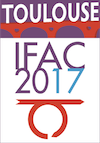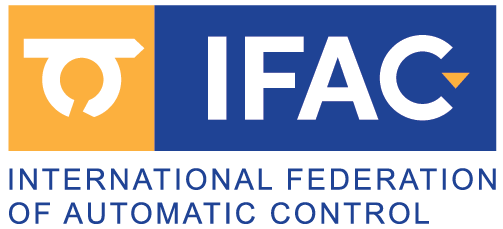The IFAC World Congress
The IFAC World Congress is the forum of excellence for the exploration of the frontiers in control science and technology, attended by a worldwide audience of scientists and engineers from academy and industry. It offers the most up to date and complete view of control techniques, with the widest coverage of application fields. The 20th IFAC World Congress will feature the 60th anniversary of IFAC. An opportunity to recall the glorious history of Automatic Control and to foresee the answers Automation and Control will provide to social, economic and ecological challenges.
IFAC'2017 New Features
The IFAC 2017 World Congress will follow the standards of IFAC, with rigorously peer reviewed papers organized in the program accordingly to the IFAC technical areas. The following new features are also introduced.
- Increased visibility for concrete contributions of automatic control to industrial, economic and social fields with an application papers category.
- A new IFAC 2017 demonstrator papers category to promote research or educational oriented devices, innovative prototypes and attractive transfer of technologies towards high-tech enterprises. Demonstrators will be presented at a dedicated exhibition aiming to highlight the advances of our research field and to perceive the future trends.
- A special IFAC 60th anniversary historical papers category dedicated to scientific discussions on how the automation and control field has emerged and grown.
- A new open invited track submission type for promoting specific research topics with no limitation on the number of papers, and open call to encourage large number of high quality contributions. Historical, demonstrator and application-oriented invited tracks are most welcome.
Areas and Keywords
Contributions to the World Congress are expected to fall in the fields covered by the IFAC Technical Areas. These are listed in the table below as well as the IFAC2017 keywords page.
| Technical Areas | more details at www.ifac-control.org/areas |
|---|---|
| Systems & Signals | Modeling, Identification, and Signal Processing; Adaptive and Learning Systems; Discrete Event and Hybrid Systems; Stochastic Systems; Networked Systems |
| Design Methods | Control Design; Linear Control Systems; Non-linear Control Systems; Optimal Control; Robust Control; Distributed Parameter Systems |
| Computers, Cognition & Communication | Computers for Control; Computational Intelligence in Control; Telematics: Control via Communication Networks |
| Mechatronics, Robotics & Components | Components and Technologies for Control; Mechatronics Systems; Robotics; Human-Machine Systems |
| Manufacturing Systems | Manufacturing Plant Control; Manufacturing Modeling for Management and Control; Enterprise Integration and Networking; Large Scale Complex Systems |
| Industrial Systems | Chemical Process Control; Mining, Mineral and Metal Processing; Power and Energy Systems; Fault Detection, Supervision & Safety of Technical Processes – SAFEPROCESS |
| Transportation & Vehicles Systems | Automotive Control; Marine Systems; Aerospace; Transportation Systems; Intelligent Autonomous Vehicles |
| Bio & Ecological Systems | Control in Agriculture; Biological and Medical Systems; Modeling and Control of Environmental Systems; Bio-systems and Bioprocesses |
| Social Systems | Economic, Business and Financial Systems; Social Impact of Automation; Control for Smart Cities; Control Education; Technology, Culture and International Stability (TECIS) |
Invited Sessions and Open Invited Tracks
Contributors can organize classical invited sessions or open invited tracks. In both cases the topics should fall within the scope of the congress and address specific, well defined issues. Invited sessions are limited to six papers and based on personal invitation by the organizers. Open invited tracks have no limit on the number of papers, organizers are expected to solicit contributions, and the track proposal is advertised on the IFAC’2017 website leaving open the possibility for anyone to contribute. See here for more details about invited sessions and open invited tracks.
Papers, Surveys & Extended Abstracts
The congress program will essentially include papers selected on the highest standard by the IPC, according to the IFAC guidelines www.ifac-control.org/publications/Publications-requirements-1.4.pdf, and published in open access in partnership with Elsevier in the IFAC-PapersOnline series, hosted on the ScienceDirect platform www.sciencedirect.com/science/journal/24058963. Survey papers overviewing a research topic are also most welcome. Contributed papers will have usual 6 pages length limitation. 12 pages limitation will apply to survey papers.
The congress will also accept a limited number of contributions based on extended abstracts, to encourage participation from industry and from colleagues outside the traditional academic control community. These abstracts, or position papers, will typically be two to four pages in length and will be subject to ad hoc peer review. Authors will present their contribution in oral or interactive sessions. Extended abstracts will appear only in the congress preprints, not in the congress proceedings.
Four Submission Categories
Contributors are invited to prepare and submit high quality original papers within the broad spectrum spanned by the IFAC technical areas. These papers can be:
- regular papers presenting theoretical or application driven research with main focus on the theoretical or methodological contribution;
- application papers presenting research with main focus on concrete contributions to industrial, economical or social fields;
- demonstrator papers exposing some prototype or pedagogical device to be presented at dedicated exhibitions during the congress;
- or history papers relating how the automation and control field has emerged and grown.
Historical, demonstrator and application-oriented invited tracks are most welcome.
Preprints, Proceedings & Copyright Conditions
Preprints, proceedings and copyright conditions are as requested by IFAC, see www.ifac-control.org/publications/copyright-conditions.
All publication material must be original and hence cannot be already published, nor can it be under review elsewhere. The authors take responsibility for the material that has been submitted. IFAC World Congress will abide by the highest standard of ethical behavior in the review process as explained in the web page cited above.
Accepted papers that have been presented at an IFAC meeting will be published using the open-access IFAC-PapersOnLine series hosted on ScienceDirect www.sciencedirect.com/science/journal/24058963. To this end, the author(s) must confer the copyright to IFAC when they submit the final version of the paper through the paper submission process. The author(s) retain the right to use a copy of the paper for personal use, internal institutional use at the author(s)’ institution, or scholarly posting at an open web site operated by the author(s) or their institution, limited to noncommercial use. Any other use of the paper requires approval by IFAC.
IFAC Journals
Subsequent derivative publication may be based on the already published IFAC event article, but must in itself satisfy all the requirements of an original contribution to the literature, as prescribed by the journal to which the paper is submitted. Whenever a derivative journal publication does eventuate then this journal paper must contain an appropriate reference to the already published IFAC-PapersOnline publication. The IPC of the IFAC World Congress may screen presented papers with the purpose of recommending the authors to consider a derivative publication of the presented paper in one of the IFAC Journals (at present: Automatica, Control Engineering Practice, Annual Reviews in Control, Journal of Process Control, Engineering Applications of Artificial Intelligence, Mechatronics, and Nonlinear Analysis: Hybrid Systems).
Oral, Interactive Sessions & Demonstrators Exhibition
The presentations will have two formats: lecture/oral sessions and interactive sessions. No value ranking is implied by the presentation format and all the papers undergo the same review process. It is at the discretion of the IPC to choose which papers are presented in either oral or interactive sessions.
- The lecture/oral presentation consists in a talk with a time window of 20 minutes in a conference room with a screen projector. 40 minutes will be allotted for survey papers.
- The interactive presentation will take place during 2 hours session slots. A space will be allocated to each speaker with a TV screen to be connected to a laptop (laptops are not provided by the organization). The presenters will be encouraged to emphasize their contributions by means of videos, simulations, demonstrations of software tools, or in classical slideshow format.
- Demonstrator papers will be presented either at interactive sessions (for video or software demonstrators) or during one day within the demonstrators' exhibition. Demonstrator category submissions should be accompanied with a concise description of the required space and the required material. Installation costs will be shared between the congress organization and the contributors.
Pre-Congress Workshops & Tutorials
You are invited to submit a proposal for the pre-congress workshops and tutorials, which will inform participants about the state of the art in specific areas of interest to the IFAC community. These can be half-day, one-day or two-days sessions. Detailed information is available here www.ifac2017.org/workshops-and-tutorials.
Submission Instructions
Papers and all other proposals must be submitted electronically using the IFAC PaperPlaza conference manuscript management system: www.ifac.papercept.net. All submissions must be in PDF format, written in English, and prepared according to IFAC format, see: www.ifac.papercept.net/conferences/support/support.php. The submission procedure is described in details at www.ifac2017.org/submit.
| Important dates | |
|---|---|
| October 2015 | PaperCept submission site opens |
| 15 September 2016 | Open invited tracks submission deadline |
| 15 October 2016 | Invited sessions submission deadline |
| IFAC-standard papers submission deadline | |
| Workshops, tutorials and extended abstracts submission deadline | |
| Notification of acceptance | |
| Final paper submission (papers can be uploaded only after the payment of the registration fee) | |
| 8-9 July 2017 | Pre-Congress Tutorials and Workshops |
| 9-14 July 2017 | 20th IFAC World Congress |
































